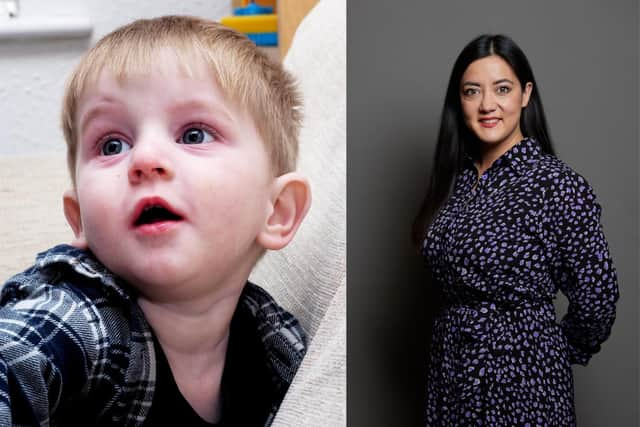Hope For Harley: Luton North MP ‘hopes government listens’ when making cystic fibrosis drug decision
and live on Freeview channel 276
Luton North MP Sarah Owen has urged the government to listen to cystic fibrosis patients and campaigners as it decides whether to keep NHS funding for life-saving medications.
Last month the National Institute for Health and Care Excellence (NICE) recommended that no new patients get the drugs, on the grounds of cost. But NICE says the recommendation is not yet final – and could change.
Advertisement
Advertisement
The family of a toddler who has the condition are now worried for what his life might look like without Kaftrio – one of the medications they had hoped would transform his health and life. They live in Sarah Owen’s constituency.


And in response to the draft guidance from NICE, the MP said: “There are families across the country and here in Luton who desperately want to see progress in treating cystic fibrosis.
“To have medications that provide proven improvements within reach, but not available to all, is incredibly frustrating and unjust. I hope that the government’s forthcoming review into the treatment of cystic fibrosis really listens to patients and campaigners – and takes into consideration not only the improvement of individual patients and the life-changing prognosis but also the benefit to society as a whole. “
NICE met on December 14 for a committee meeting to discuss the draft guidance which set out that people who are taking the drug will be allowed to carry on taking it, but no new patients will be able to get it through the NHS. Kaftrio, which is manufactured by American pharmaceutical company Vertex, costs £8,346 for a packet of 56 tablets. Harley would need to take two of these a day – meaning NHS treatment could tally up to more than £180,000 per year.
Advertisement
Advertisement
Last month, the Medicines and Healthcare Products Regulatory Agency extended the licence of the cystic fibrosis medicines Kaftrio and Kalydeco for children aged two to five years old. If funding is kept the same, Luton toddler Harley, could receive the life-enhancing and prolonging drug as early as April next year, when he turns two years old.
Last week, Harley’s mum, Bethany, said: “I just don't understand how they can have this drug that is saving lives, and then they're going to stop the funding. Yes, so many people have accessed it already. But there's going to be so many babies born who won't have access to this treatment, and it's not right to deny parents and families of these children access to these life-saving drugs.”
A petition calling for continued funding for the drugs already has over 65,000 signatures, and 35,000 more would mean the issue is debated in Parliament.
The petition can be found here and takes less than a minute to sign.
In response to the petition, the government said: “Existing patients will be eligible for continued treatment during and following the NICE evaluation. NICE is working with all parties to address the issues raised in its draft guidance.
Advertisement
Advertisement
“The government recognises that cystic fibrosis can have a huge impact on the physical and mental health of those affected. We recognise that cystic fibrosis presents significant challenges to the quality of life of patients and their families, and are committed to supporting timely access to effective new treatments in a way that is fair to all parties.
“It is important we ensure that NHS funds are spent in a way which provides the most health benefit for society, as every pound that is spent by the NHS on medicines is money that is not available for other health spending. The National Institute for Health and Care Excellence (NICE) is the independent body responsible for developing evidence-based recommendations on whether medicines should be routinely funded by the NHS based on an assessment of their costs and benefits.
“This process means that the NHS can be confident that spend on NICE recommended medicines will not displace other more effective treatments. These are very difficult decisions to make and it is right that they are made independently of government on the basis of the available evidence. NICE recommends the vast majority of medicines for use on the NHS, often as a result of commercial arrangements struck between the NHS and companies. The NHS is legally required to fund medicines recommended by NICE and many thousands of patients have benefitted from access to new medicines as a result of its important work.
“NICE’s appraisal of Orkambi, Symkevi, and Kaftrio is now underway and NICE and has unfortunately been unable to recommend the medicines for routine funding at the price proposed by the company in its draft guidance published on 3 November. While the Department understands this has been extremely disappointing to those affected, it is important to note that recommendations on medicines can, and often do, change during the NICE process. The draft guidance was subject to a public consultation which closed on 24 November and NICE is continuing to work with the manufacturer, NHS England and other stakeholders to address the issues it raised.”
Advertisement
Advertisement
The final guidance from NICE is due to be published in March next year. The government added: “Under the terms of the interim access agreement, eligible children and adults with cystic fibrosis can continue to receive and be initiated onto treatment with Orkambi, Symkevi and Kaftrio while NICE’s appraisal is ongoing. It is also important to note that there is a flexible commercial mechanism in place between NHS England and the manufacturer to ensure that patients already receiving these treatments will have continued access following the publication of NICE’s final guidance, regardless of the outcome.”
